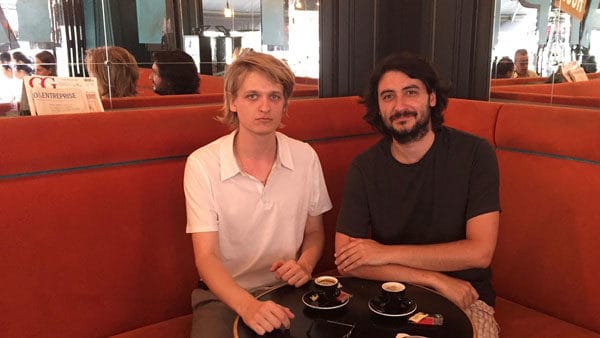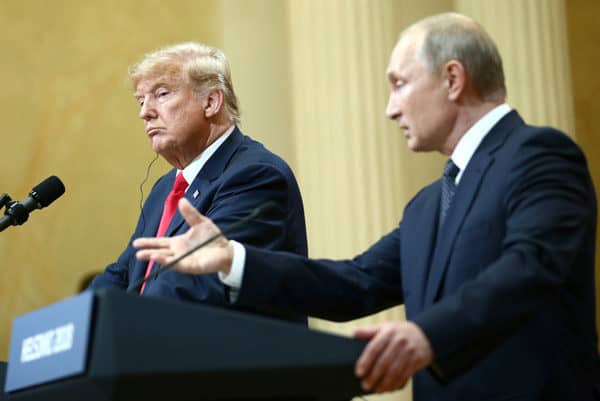A European View on White Survival
Grégoire Canlorbe, American Renaissance, August 17, 2018

A conversation with Daniel Conversano
Daniel Conversano is a Franco-Italian thinker and novelist who defines himself as a white advocate and Westernist. Twice a month he publishes long, filmed interviews, which he has been conducting since April 2016. The program is called “Vive l’Europe” and is very successful on the French-speaking internet. He is also the co-founder of Suavelos, a collective of young men, bloggers, YouTubers, journalists, and writers who work for the interests of whites in French-speaking Europe.
Grégoire Canlorbe: How do you move from fighting for the nation to fighting for the white race?
Daniel Conversano: In my opinion, there is no nation without a people. This is why I have long defined myself as a nationalist and not as a patriot, the difference between the two being that the nationalist takes into consideration the people in its racial dimension — the blood. France is a white country, like all European countries. The population of a white nation may change ethnically from one European group to another, it will remain a white country, and therefore a European nation.
As for clarifying what the “white race” is, there are many scientific definitions from anthropology to population genetics. At minimum, I think we can agree on an almost geographical approach to the notion — namely, that the whites are “the locals” of Europe. The French people are made up of Celtic Whites, Germanic Whites, Franks, Latins, Basques, and Bretons. These are the main ethnic groups that forged the history of France.
Grégoire Canlorbe: You like to describe the civilization of the white race, or Western civilization, as superior. Please explain.
Daniel Conversano: I consider culture as the product of blood. Peoples achieve at levels that correspond to their aptitudes. They develop the value systems that express their mentality. It is, admittedly, not politically correct to point this out, but it is possible to establish hierarchies between nations according to results — whether from the point of view of technology, standard of living, arts, or individual.
I would not say that Western civilization is absolutely superior to Chinese or Japanese civilization, for example. As for the Arabs, it must be understood that their culture has been destroyed by Islam, and that their current backwardness seems essentially linked to religious rather than ethnic reasons. Black Africans have never created civilizations, in the generally understood sense.
Clearly, Western civilization — and by that I mean Europe, North America, Australia, or even Western Russia — seems to me to be superior to everything that could be produced on the African continent and in much of the Islamic East. It is in the West that one lives the best, and immigration from the Third World reflects this.
Grégoire Canlorbe: It is sometimes argued, in the field of historical sociology, that the foundation of Western civilization lies in heroism — in praising and encouraging exceptional individuals because they are exceptional. Do you agree?
Daniel Conversano: Yes, heroism is at the heart of the story of the white man. The history of the West boils down to the slow and progressive understanding of the uniqueness of human life, and of the individual importance of exceptional men, whose scientific, political or artistic work stands the test of time. How have we been able to offer those men the life they deserve, so that their genius may flourish? That’s what fascinates me. In this respect, the West seems to me to be distinct from Asian cultures, which put the collective before the individual, social cohesion before self-fulfillment, and are therefore not favorable to the expression of human genius.
There are men who have more individual worth than others — in any society. It is normal that those men be put forward. It is normal for them to be given a life that allows them to give their best and perform works that benefit the whole of society. I do not defend just free enterprise; I defend a mobile hierarchy, which rests on natural superiority, and which rewards genius, intelligence, work, honor, abnegation, and the capacity to bring good to society.
To me, liberalism should be the means to establish a just hierarchy — as opposed to a rigid hierarchy that disdains the deserving and creative individual, and does not allow him to rise socially. Frédéric Delavier puts it well: France is essentially a country of castes that ignores the culture of heroism in favor of a culture of degrees and credentials. It goes without saying that I am not nostalgic for the Ancien Régime, although I readily admit that it was the royalists who made France. A person born a commoner had a predetermined fate, dark and off-putting; he could not hope for improvement. The castes of the past were not much more rigid than those of today.
At the bottom line, I would say that we have to preserve heroism, which veritably stems from the Greek spirit, but to go forward rather than ignore the obsolete character of the inequalities of the Ancien Régime. We must defend the French people, which is a European people of the white race and a Christian culture, but I would say that we must promote liberalism — on the condition that it favors individual fulfillment, and that it allows a more equitable society, instead of enforcing a new caste system based on money, nepotism, and academic degree. For this reason, the synthesis of national-liberalism seems to me to be the politically desirable path.

Grégoire Canlorbe (left) and Daniel Conversano, Paris, July 2018
Grégoire Canlorbe: Broadly speaking, one cannot but notice the persistence of so-called cosmological beliefs — those relating to how one should live — while so-called material beliefs — those relating to how one should make a living — are much more flexible. This observation both corroborates and helps qualify the hypotheses of the innate, genetic character of Asian populations.
If cosmological beliefs seem to be predetermined, rooted (into genes), material beliefs seem to enjoy a relative autonomy: Thus, China or Japan were able to import Western capitalism, while remaining “Asian,” and therefore communistic, so to speak, in their manners and customs. How do you explain it?
Daniel Conversano: Indeed, it could be said of current Chinese and Japanese that they are communist-capitalists. This situation is an enigma to me. As you suggest, mentalities, “cosmological beliefs,” seem to evolve less quickly than technology and economics. If I give an iPhone to a Nigerian, and even if he learns to use it well, it will not make him a Westerner. Similarly, the Chinese may well have an economic model similar, if not identical, to that of the West, but the structure of Chinese society remains foreign to us. Women have a distinct role and miscegenation is still frowned on. Good for them.
For reasons which are not truly religious — at least, in the sense understood by the religions of the Book — and which rather relate to the weight of the traditions conveyed by family, and to the shame that one feels in violating them, the disgrace to which one is subjected, Chinese society remains “communistic.” The Chinese, whose average IQ is, as everyone knows, very high, have understood that Marxism is both a totalitarian nightmare and an economic disaster. North Korea is no exception and proves the inevitable failure of the communist model. Capitalism triumphs wherever it is adopted. The Chinese know that there is no alternative; like the Japanese, but also the Indians, they became capitalist without denying their communal morals and their cultural heritage.
Grégoire Canlorbe: Many European white nationalists consider a rapprochement with Russia as a bulwark against the destructive policy of the United States. Now that Trump is in the White House, should this thinking be modified?
Daniel Conversano: The French Right has been traditionally anti-American. It seems to me that this is less an objective criticism than a mark of jealousy. Trump has upset the image that we had of the United States, that of a decadent and cosmopolitan country, whose foreign policy is complacent towards Islam but deliberately seeks conflict with Russia. I would not say that Trump has a friendly policy towards Putin, but they seem to have both agreed to a non-aggression pact in the face of the much more worrying threat of Islamic terrorism.

(Credit Image: © Sharifulin Valery/TASS via ZUMA Press)
Personally, I consider Trump a very great leader, who has revitalized the US economy and is restoring the power of the United States after the grim Obama years. Obviously, he defends American interests first and foremost on the international scene, and that’s perfectly normal. However, given the demographic dynamics of the United States, I am afraid that Trump will not be re-elected in 2020. Yet, a victory of the Democrat camp would cancel everything that Trump is trying to do. I think there could be a Zuckerberg candidacy, and his victory would be a disaster. I sincerely hope that Trump’s mandate will not be the swan song of white America.
I cultivate a strong interest in, and feel a great affection for, the Slavic-Orthodox culture. As for knowing whether it’s better to get closer (in the long run) to America or Russia, I think it’s worth keeping in mind that Putin is not concerned with establishing what would be a sort of a white empire, from the Atlantic to the Pacific. Although the Slavs are undeniably white, they do not worry very much about the fate of France or Germany, faced with the Arab-Muslim and African invasion. Putin already has his hands full with his own Muslim population.
From a nationalist point of view, I therefore do not see France’s interest in isolating us from the United States and getting closer to Russia exclusively, in the vain hope that Putin will come and clean up the mess here. Establishing neutral diplomatic relations with both countries, while waiting to see how the United States evolves after the Trump era seems to me to be the smartest option.
Grégoire Canlorbe: What program do you propose, ultimately, to repel the migratory invasion and save the bio-cultural identity of France?
Daniel Conversano: I think that the gravity of the situation in which France finds itself is not understood abroad. The figures are uncertain, but in the most optimistic perspective, we are at 15 million non-Europeans, that is to say Africans and Arab Easterners — perhaps even as many as 20 to 25 million — out of a population of 70 million. That makes a third of the population, which is considerable.
By eliminating the social benefits to foreigners, we could at least close the migratory tap. As Guillaume Faye likes to point out, it never occurs to an African to go to Japan, since there, nothing is offered to him. France and the rest of Europe must copy the Japanese model of immigration.
As for Muslims, I am in favor of establishing a legal climate that makes it clear that they are not welcome on the French soil — including the prohibition and the closing of mosques, the prohibition of teaching the Koran. In this way, Muslims will be dissuaded from staying in or coming to France; and Muslims will return home
We can still win. But the battle must begin as soon as possible.















